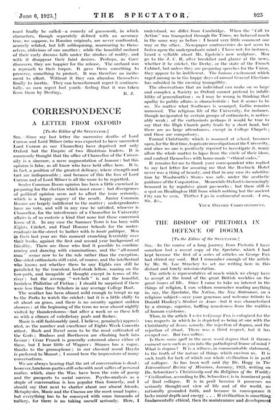CORRESPONDENCE
A LETTER FROM OXFORD
[To the Editor of the SpEc-r.vroa.1
Sin,—Since my last letter the successive deaths of Lord Curzon and Lord Milner (who was expected to have succeeded Lord Curzon as our Chancellor) have deprived not only Oxford but the Empire of two illustrious leaders. It is commonly thought that the office of Chancellor of the Univer- sity is a sinecure, a mere augmentation of honour : but this opinion is false, as all know who have held office here. It is, in fact, a position of the greatest delicacy, where strength and tact are indispensable ; and because of this the loss of Lord Curzon and of Lord Milner is all the more to be regretted.
Senior Common Room opinion has been a little exercised in preparing for the election which must ensue ; but divergences of political opinion seem not to affect the issue seriously, which is a happy augury of the result. Junior Common Rooms are largely indifferent to the matter ; undergraduates have no vote, and will in any case be satisfied, whoever is Chancellor, for the interference of a Chancellor in University affairs is of so esoteric a kind that none but those concerned know of it. In any case the Summer Term is too busy with Eights, Cricket, and Final Honour Schools for the under- Fr,raduate-in-the-street to bother with la haute politique. Men in their last year are this moment crouching feverishly over their books, against the first and second year background of frivolity. There are those who find it possible to combine rowing and dancing with examinations, and the " all-round man'' seems now to be the rule rather than the exception. One-sided enthusiasts still exist, of course, and the intellectual who knows not whether there be any Eights can still be paralleled by the truculent, beef-steak fellow, roaring on the tow-path, and incapable of thought except in terms of the river ; but the average " wet-bob " is not the boastful, brainless Philistine of Fiction : I should be surprised if there were less than three Scholars in any average College Boat.
The weather has been almost mild enough to tempt us up to the Parks to watch the cricket : but it is a little chilly to sit about on grass, and there is no security against sudden showers : at the beginning of the term we were almost nightly . visited by thunderstorms—but after a week or so these left us with a climax of valedictory peals and flashes.
Music is still fashionably (and, I believe, genuinely) appreci- ated, as the number and excellence of Eights Week Concerts attest. Bach and Ravel seem to be the most cultivated of the Gods ; Brahms and Beethoven are climbing back into favour : Cesar Franck is generally esteemed above either of these, but I hear little of 'Wagner : Strauss has a vogue, thanks to the gramophone ; in our classical mood Haydn is preferred to Mozart ; I record here the impressions of many conversations.
We are always hearing that the art of conversation is dead ; however, luncheon-parties still echo with neat sallies of personal malice, which, since the War, have been the coin of gossip and the passports to social success. Psycho-analysis as a staple of conversation is less popular than formerly, and I should say that next to chatter about our absent friends, Metaphysics, Music and the Cinema are the most usual topics but everything has to be conveyed with some innuendo of 'raillery, for there is no taking oneself seriously. Here. I understand, we differ from Cambridge. When the "Call to Action" was trumpeted through the Times, we behaved much in the same way as before : I heard very little comment one way or the other. Newspaper controversies do not seem to fasten upon the undergraduate mind ; I have not, for instance, heard a syllable about Mr. Epstein's new sculpture. Men go to the J. C. R. after breakfast and glance at the news, whether it be cricket, the Derby, or the state of the French Cabinet, but unless they are preparing speeches for the Union, they appear to be indifferent. The furious excitement which raged among us in the happy days of annual General Elections has subsided in the ensuing tranquillity.
The observations that an individual can make on so large and complex a Society as Oxford cannot pretend to infalli- bility of generalization ; so I may be wrong in thinking that apathy to public affairs is characteristic ; but it seems to be so. No matter what Sosthenes is scourged, Gallio remains unmoved. The religious life of the University, for instance, though invigorated by certain groups of enthusiasts, is notice- ably weak ; of the enthusiasts perhaps it would be true to say that the High Church party leads by a short head, but there are no large attendances, except in College Chapels ; and these are compulsory.
Formal Christianity which is , assumed at school, becomes open, for the first time, to private investigation at the University, and since no one is positively required to investigate it, many allow the whole matter to lapse from the circle of their ideas, and content themselves with home-made " ethical codes."
It remains for me to thank your correspondent who replied to my last letter for assuring me that the Roebuck Hotel never was a thing of beauty, and that in any case its substitu- tion by Woolworth's Stores was safe, under the aesthetic guidance of the Corporation. Meanwhile Oxford is increasingly hemmed in by repulsive giant gas-works ; but there still is a spot on Headington Hill from which nothing but the ancient City can be seen. Thither I go in sentimental mood.—I am, Sir, &c.,
YOUR OXFORD CORRESPONDENT.














































 Previous page
Previous page